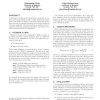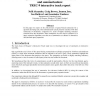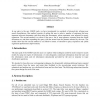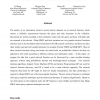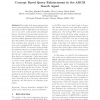TREC
2007
14 years 1 months ago
2007
In TREC Genomics a question/answering task has been proposed. A set of questions with a specific entity of interest is proposed and a set of passages from a collection of full te...
TREC
2007
14 years 1 months ago
2007
In this paper, we discuss the experiments conducted in context of Document Search task of 2007 Enterprise Search track. Our method is based on selecting sentences from the given r...
TREC
2000
14 years 1 months ago
2000
There is a reservoir of knowledge in data from the TREC evaluations that analysis of precision and recall leaves untapped. This knowledge leads to better understanding of query ex...
TREC
2000
14 years 1 months ago
2000
In this paper we report on the effectiveness of query-biased summaries for a question-answering task. Our summarisation system presents searchers with short summaries of documents...
TREC
2003
14 years 1 months ago
2003
In our entry to the new HARD track, we have investigated two methods of interactively refining user search formulations. One method consists of asking the user to select a number ...
TREC
2003
14 years 1 months ago
2003
Our participation in TREC 2003 aims to adapt the use of the DFR (Divergence From Randomness) models with Query Expansion (QE) to the robust track and the topic distillation task o...
TREC
2004
14 years 1 months ago
2004
The quality of an information retrieval system heavily depends on its retrieval function, which returns a similarity measurement between the query and each document in the collect...
TREC
2004
14 years 1 months ago
2004
In the domain of biomedical publications, synonyms and homonyms are omnipresent and pose a great challenge for document retrieval systems. For this year's TREC Genomics Ad ho...
TREC
2004
14 years 1 months ago
2004
Our participation in TREC 2004 aims to extend and improve the use of the DFR (Divergence From Randomness) models with Query Expansion (QE) for the robust track. We experiment with...
IC
2003
14 years 1 months ago
2003
The quality of the search experience has been an enduring problem for the World Wide Web. One of the well-known difficulties is the tendency of users to use short, under-specified...

